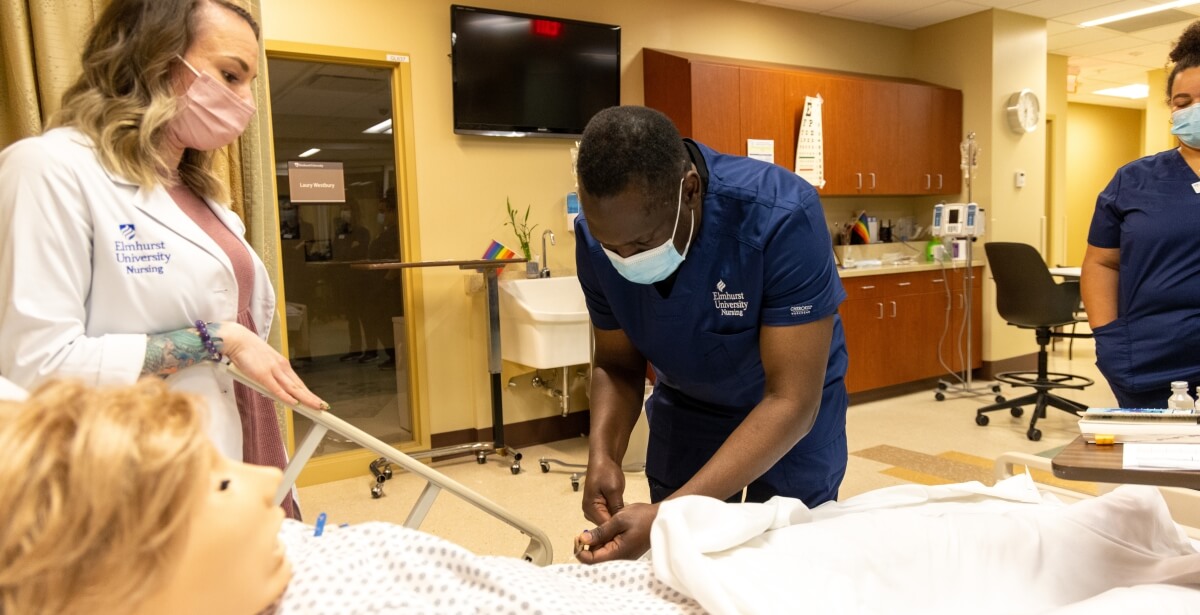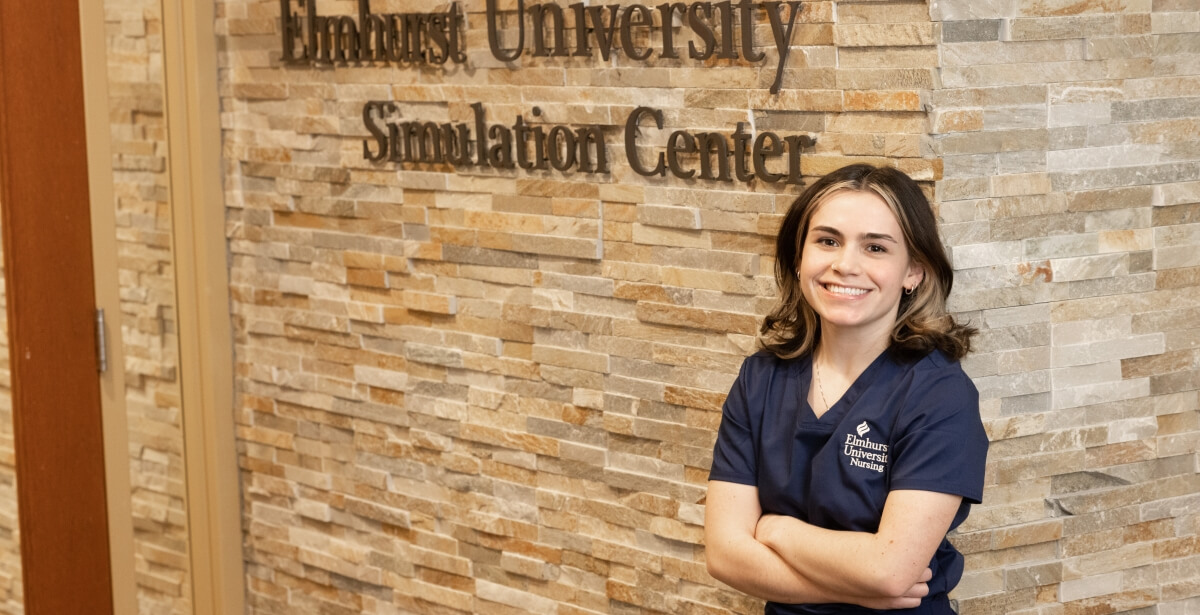What Can You Do With a Master's in Nursing?

Blog Updated on October 17, 2025.
Earning a master’s degree in nursing can help you have a positive impact on health care. A higher level of education among nurses can have a greater impact on the types of care strategies that may improve patient outcomes and reduce health care costs.
Nurses with Master of Science in Nursing (MSN) degrees can work in a wide array of roles, including consultancy, education, administration, advanced practice (with some additional training) and clinical nurse leadership. If you have a bachelor’s degree and are looking for a meaningful career, a master’s in nursing program could open up doors for you.
The nursing field encompasses a wide array of specializations and job titles that offer growth opportunities, allowing you to build a nursing career with roles that match your interests, skills, and professional goals. A Master of Science in Nursing (MSN) degree takes nursing careers to the next level by combining advanced lessons and clinical experiences. With that in mind, you might be wondering what you can do with a master’s in nursing.

What Are the Benefits of a Master’s Degree in Nursing?
There are many benefits of earning a master’s degree in nursing.
1. Flexibility
An MSN opens the door to a career that allows for more flexible hours, such as an educator or consultant. This may include more traditional schedules during the day, with holidays and weekends off.
Working as a clinical instructor for prelicensure nursing programs at a university is a great opportunity to work during the daytime hours. Control over your work schedule allows you to work when you’re most productive.
2. Autonomy
An MSN can open up career advancement opportunities, allowing you to provide care more autonomously. For example, nurse consultants can become private business owners, running their own practices. Alternatively, nurse entrepreneurs can create and patent products to help maintain health. Autonomy allows nursing professionals to focus on what they care about and work more independently.
3. Leadership Opportunities
Nurses who earn MSNs can advance into leadership roles. Successful nurse leaders are innovators who influence and strategically advise others to reach a common goal. They collaborate with many other professionals to lead teams to improve patient outcomes and positively impact policy. Popular roles that require a master’s in nursing include chief nursing officer, unit director and clinical manager.
4. Purpose in Life
According to the FlexJobs 2025 State of the Workplace Report, 48% of people who either changed career fields or considered swapping stated “greater job fulfillment” as a prime factor. Nursing touches every aspect of life, from birth all the way to death, helping people on the worst and best days of their lives. Not many careers provide you with such a strong sense of purpose.

Career Paths for MSN-Prepared Nurses
There are many options for professionals wondering what to do with a master’s in nursing. MSN-prepared nurses can lead the nursing profession as nurse administrators, clinical nurse leaders, informatics experts, educators and consultants.
Advanced Practice Registered Nurses
With some additional schooling, an MSN-educated nurse can obtain postgraduate certification to practice as an advanced practice registered nurse (APRN). MSN-prepared advanced practice nurses fall into one of four categories: nurse practitioner (NP), nurse anesthetist, nurse midwife and clinical nurse specialist.
Nurse Practitioner
Registered nurses (RNs) with advanced practice in nursing master’s degrees can amplify their impact on patient care as NPs. This job significantly overlaps with the services offered by physicians, including diagnostics, prescriptions and health counseling, giving NPs more autonomy in their nursing practice.
Nurse Anesthetist
Nurse anesthetists, an advanced practice MSN job, work in clinical settings where surgical procedures are performed. Nurse anesthetists conduct patient evaluations before and after surgery to improve recovery. Responsibilities during surgeries include monitoring vital signs and maintaining necessary anesthetic levels.
Nurse Midwife
The centuries-old role of the midwife continues in modern medical settings by highly trained specialists. Nurse midwives provide care and advice to women before, during and after pregnancy. Practitioners in this MSN job also offer preventive services, including physical exams and contraceptive education.
Clinical Nurse Specialists
Clinical nurse specialists, such as those with an MSN from an online accredited direct entry MSN program, are experts in specific patient populations and develop protocols, order sets and quality improvement initiatives. In states with full practice and full prescriptive authority, they can diagnose medical conditions and prescribe medications.
|
Job Title |
Median Annual Salary (Approx.) |
|
Nurse Practitioner |
$129,210 |
|
Nurse Anesthetist |
$223,210 |
|
Nurse Midwife |
$128,790 |
|
Clinical Nurse Specialist |
$105,200 |
Sources: U.S. Bureau of Labor Statistics, Payscale
Other Roles for MSN Graduates
There are several MSN career paths that aren’t advanced practice roles. These roles may be ideal if you’re interested in jobs outside the hospital setting.
Nurse Entrepreneur
MSN-prepared entrepreneurs combine their medical knowledge with business acumen. They can design products, obtain patents and market their business. The public trusts nurses, creating an instant competitive advantage in business.
Informatics Nursing
Informatics integrates technology, mainly electronic health records (EHRs), into institutions. Nurse informatics professionals design the programs while incorporating the needs of the patients and staff. The usability of the technology is vital to success. Informatics nurses know how to balance patients’ needs with technology.
Nurse Educator
Experienced nurses can prepare newcomers to the field in educational roles, with nurse educators working in teaching hospitals, universities or technical schools. This role involves demonstrating clinical skills and mentoring nurses as they apply classroom lessons in practice.
Legal Nurse Consultants
Legal nurse consultants work with lawyers to review patients’ records to determine whether the health care provided was within the accepted standard of practice. Legal nurse consultants collaborate with lawyers to review medical records. They work for both the patients and the health care facilities.
Public Health Nurses
Public health nurses work on community issues such as socioeconomic strain, food insecurity and disease prevention. These nurses may work with local public health departments, nongovernmental organizations or insurance companies, focusing on population health.
|
Job Title |
Median Annual Salary (Approx.) |
|
Nurse Entrepreneur |
|
|
Informatics Nurse |
|
|
Nurse Educator |
|
|
Legal Nurse Consultant |
|
|
Public Health Nurse |
Sources: ZipRecruiter, Payscale

A Promising Future for MSN Jobs
The in-demand jobs described above are only a small segment of job opportunities available to nurses with the right education and training. The BLS projects a 5% growth in registered nursing positions across the United States from 2024 to 2034. It’s worthwhile to consider why nursing positions are expected to grow and how a master's degree in nursing can boost your job prospects.
Transitions in a Revered Profession
A wave of retirements by experienced nurses in the baby-boom generation leaves vacancies for newcomers, with the American Association of Colleges of Nursing (AACN) projecting that 1 million nurses will leave the workforce by 2030, primarily due to retirements.
High demand for nurses will lead to large numbers of applicants because nursing remains a popular and fulfilling job. U.S. News & World Report ranked nurse practitioner its No. 1 job for 2025—the second consecutive year the profession has held the title.
Unlocking Job Opportunities With a Graduate Degree
Newcomers to the nursing profession prepare for rising educational expectations by completing master’s degrees. Nurses with master’s degrees were few and far between before 1980, as vocational education was more common. AACN reports that as of 2022—the last time the organization conducted the survey—the demand for nurses with a graduate degree far outpaced the number of nurses who held one.
Graduate degrees combined with on-the-job experience are required for nursing leadership positions in most locations. Earning an MSN also builds the knowledge necessary to fill in gaps left by staff retirements. This knowledge improves patient care while creating opportunities for promotions to leadership positions.
Preparing for MSN Jobs at Elmhurst University
There are many ways to decide what to do with a master’s in nursing if you’re ready to make the move to the field. Elmhurst University helps professionals in other fields transition to nursing careers with its Master’s Entry in Nursing Practice (MENP) program. This full-time nursing program builds off of your existing bachelor’s degree education in a discipline other than nursing and uses classroom lessons and practical experiences to prepare students for Clinical Nurse Leader (CNL) certification. Graduates will earn their MSN degree and then be able to bridge to advanced practice specialties through the successful completion of a postgraduate certification program. The MENP program is the first step toward the MSN jobs listed here and more.
Moving from your current career to the nursing field is easier with Elmhurst’s direct-entry MSN program. Experienced faculty members impart lessons to future nursing leaders in the following topics:
- Advanced Pathophysiology
- Epidemiology and Biostatistics
- Mental Health Nursing
- Leadership in Systems and Organizations
MENP nursing students build connections within the Chicagoland health care community during their time at the University. This network is made all the more powerful thanks to Elmhurst’s strong regional reputation. U.S. News & World Report ranked the University among the best schools in the Midwest in the following categories:
- 12 in Best Value Schools
- 7 in Regional Universities Midwest
- 1 in Best Colleges for Veterans in the Regional Midwest
Learn more today about how Elmhurst’s MENP program can elevate your nursing career.

